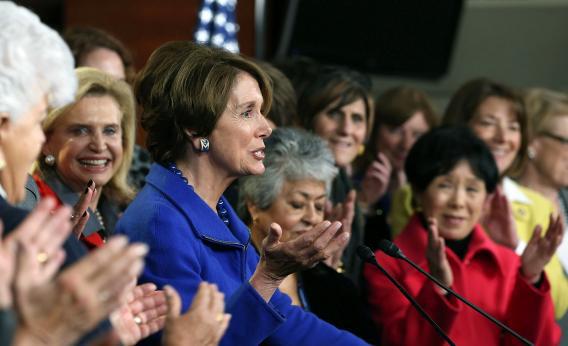When Nancy Pelosi rolled, she rolled deep. The current minority leader of the Democrats in the House arrived at her announcement presser with most of the House’s incoming class of female members. There was Rep.-elect Tammy Duckworth wearing a star-spangled prosthetic leg. There were Kyrsten Sinema and Tulsi Gabbard, age 36 and 31, who’d be the House’s first openly bisexual member and its first Hindu member, respectively.* There was an old Pelosi ally, Rep. Jan Schakowsky, unable to find space on the stage because of the crowd. “It’s a good problem to have,” said the leader.
Pelosi’s wind-up was epic. For nearly 10 minutes, she praised her fellow female members and admitted that “we want more.” She emptied the cliché-o-matic, talking about the need to “reignite the American dream” and work “for a healthy nation, a healthy political arena, a healthy planet.” Finally, after cable had cut away, she announced that she’d “made the decision that some of you might have some interest in.” She was running for leader again. Her team of women burst into cheers.
In 2010 there were real questions about whether Pelosi could lead the party. Fortunately for her, there weren’t many conservative Democrats around to ask the question. Rep. Heath Shuler, a moderate Democrat from western North Carolina, challenged her on the grounds that she’d made the Democrats unelectable, and he got creamed. This year, Pelosi could point to eight Democratic gains—just 17 seats away from control of the House again. Shuler and some other Blue Dogs had been beaten or gerrymandered out of existence.
“I don’t want to say it’s better than having the gavel, but it will be better than the last Congress,” said Pelosi. “Some of the people who were anti-government ideologues are gone.” Liberals had clearly won this month. “There’s something very positive about this election, that this president who was held under such terrible comments by the other side was re-elected.”
Pelosi started taking questions. The first one that broached the reality—that Pelosi, for the second time, would be leading a minority—came from Luke Russert of NBC News.
“Mrs. Pelosi,” said Russert, “some of your colleagues privately say that your decision to stay on prohibits the party from having younger leadership. It hurts the party in the long term. What’s your response?”
The women around Pelosi erupted—booing, hissing, one member snapping “discrimination!” Pelosi told Russert to ask the same question to Mitch McConnell. The women cheered.
“Excuse me!” interjected Russert, who was asking a question that was inevitably going to come up. “You, Mr. Hoyer, Mr. Clyburn, you’re all over 70. Does staying on prevent younger leadership from moving forward?”
“So you’re suggesting that everyone move aside?” asked Pelosi.
“No, I’m simply saying that to delay younger leadership from moving forward …”
“Let’s, for the moment, honor that as a legitimate question, even though it’s very offensive. You don’t realize that, I guess. The fact is that everything I have done in my, I guess, decade now of leadership, is to let younger and newer people come up. In my own personal experience, it was very important for me to elect young women. I came to Congress when my youngest, Alexandra, was in college. I knew that men who came here in their 30s had a jump on me.”
Pelosi comes from a political family. Her father and brother were both mayors of Baltimore. She moved to San Francisco at age 29, though, starting an independent political operation there. The idea that she would leave the leadership right after her party gained back some House seats was always a little strange. By making herself a sort of avatar of female accomplishment, he tried to make the idea sound risible. Even the new members, who hadn’t been around for Pelosi’s reign as speaker, were offended at the suggestion.
“When you’re young, you don’t know what you don’t know,” said Rep.-elect Lois Frankel, who’d just won a seat in south Florida. “We saw all those billboards in 2010—fire Pelosi! But when you get to know her, she’s just the nicest, sweetest person you can imagine.”
Correction, Nov. 14, 2012: This post originally misspelled Tulsi Gabbard’s first name.
